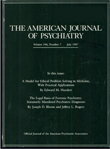Low use of neuroleptic drugs in the treatment of psychotic major depression
Abstract
OBJECTIVE: The adequacy of pharmacologic treatment received by patients with psychotic major depression was evaluated. METHOD: The authors systematically assessed the pharmacotherapy received by 187 depressed patients before initiation of ECT and compared the medication trials of those with psychotic (N = 53) and nonpsychotic (N = 134) depression. RESULTS: Despite a median of four medication trials and median index episode duration of 20 weeks, only two (4%) of the patients with psychotic depression received at least one adequate pharmacotherapy trial. In contrast, 70 (52%) of the patients with nonpsychotic depression received at least one adequate trial. Twenty-five (47%) of the patients with psychotic depression received either no neuroleptic treatment (N = 11) or treatment for less than 3 weeks (N = 14). Only eight (15%) received a daily neuroleptic dose higher than 200 mg of chlorpromazine equivalents. CONCLUSIONS: These findings suggest that many patients with psychotic major depression referred for ECT receive inadequate pharmacotherapy because of either the absence or the inadequate use of neuroleptic medication.



